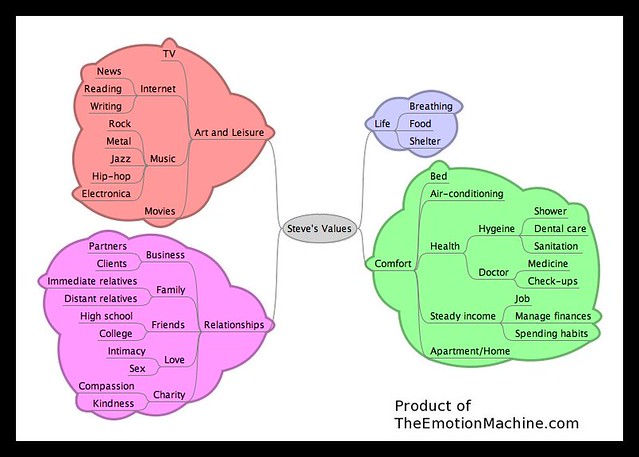
I don’t care what anyone says: everyone has something they value in life. Values are the guiding forces we use to make decisions and choose our actions. They are motivators. And without them we wouldn’t be much of anything but breathing rocks.
But we aren’t breathing rocks. We aren’t rocks at all. We are conscious human actors. We have goals, and we don’t like being thrown down steep hills or into dirty ponds without our consent. We want to be in charge of where we go.
And wherever we go is largely up to us, only some of us are more ambitious than others. Some want to get into Harvard Medical School, while other, “less ambitious” individuals may just want to sleep for 3 more hours and show up to work late. But whatever – those are our choices, we can express our values however we like, as long as we are willing to bear the consequences in return for the benefits. That is for us as individuals to decide.
Why should I follow my values
A lot of people don’t pay attention to what they value. The problem with this, however, is that these values will effect our lives regardless of whether or not we are conscious of them, so we might as well get to know them. We can find out what drives us to do certain behaviors, and we can use this knowledge to adopt new behaviors.
While we may not be happy with the way our lives are turning out, somewhere in the back of our minds there is rationale for it. So why do we continue certain negative thoughts or behaviors? Because somewhere we are getting a reward for it, even if we don’t find out until much later that it wasn’t worth the costs or effort.
Values depend on other values.
There is no such thing as a value in a vacuum.
I have a hypothetical friend named John. He likes to eat McDonalds because he values tasty food. However, he also values living a long and healthy life. These values are somewhat in conflict. Therefore, John is going to need to arrange his values in a way that allows for balance. For example:
- John values tasty food, but maybe he can find some healthier alternatives.
- John values tasty food, but maybe he will only treat himself to fast food once a month.
- John doesn’t value living a long and healthy life as much as he enjoys McDonalds everyday. He figures, “I might as well enjoy life while I can.”
Or maybe:
Some of these preferences we might disagree with, but that isn’t for us to decide. That is for John to decide. The key thing to remember is that we all have values that need to be compromised with one another. There are trade-offs everywhere; in every decision that we make there are opportunity costs. What is important is that it is our decision to make.
– Ayn Rand
Values are not objective in the sense that they exist “outside of the human mind.” They are interdependent on the object being valued and the subject whom is valuing it. Only we can understand our values fully, not others.
How to keep track of your values
Tips and suggestions.
The lesson of this post is that keeping track of your values is important. There are a number of ways you can do this, and some work better than others. Even better is to utilize these in different combinations:
- Be mindful of your thoughts (especially when trying to make a tough decision)
- Interrogate yourself
- Have a conversation with someone about what matters in life
- Draw up a mind map (see below for more details)
- Pay attention to your actions and how you react to them emotionally
It is hard to understand our values if we don’t look inside our heads from time to time. When we talk to others we can get a better sense of ourselves, but no one can define what you want. Value-making is not just a tool to aid our lifestyles, it is also an obligation we have to ourselves. It can take hard work and years of listening.
I’ve been defining and re-defining my values ever since I got into “self-improvement” four years ago. They are still always changing, and I always need to remind myself what it is I truly want out of life.
My Mind Map
I came up with a quick mind map just to give you a visual example of some of the ways you can organize your values. With mind maps you can break a core concept down into main categories, and then divide those into smaller and smaller chunks.

I only took 5 minutes to come up with this so it is by no means perfect (even looking at it right now I can see some big things I missed). However, one good thing about using Mind mapping software is that you can always go back and add new concepts or re-arrange them (I use FreeMind for Mac, it’s completely free and a great brainstorming tool).
Questions…
- How often do you reflect on your values in life?
- Do you find it is hard to act on values that are uncommon?
- What are the toughest values for you to balance?
- What can you do to keep better track of your values?
Enter your email to stay updated on new articles in self improvement:
